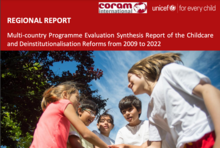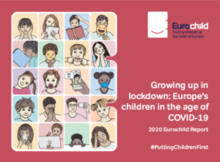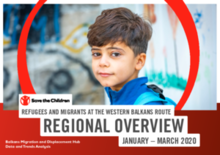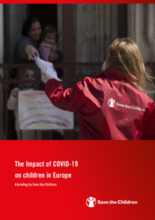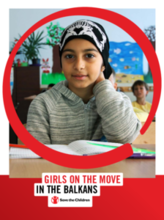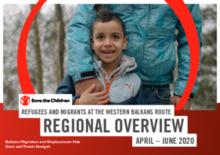Displaying 1 - 10 of 48
The first comprehensive “Benchmarking Report on Parenting Support Policies and Programs in the Republic of Serbia” aims to support national and local efforts to improve the availability and quality of systemic, cross-sectoral support for parents and caregivers in Serbia, in order to ensure the optimal development of children and young people.
This report presents the main findings, conclusions, and recommendations of an evaluation of the child care and deinstitutionalisation reforms in seven countries in the Europe and Central Asia Region (Bulgaria, Georgia, Moldova, Montenegro, Northern Macedonia, Serbia and Tajikistan). The report offers valuable insights into the effectiveness of child protection systems and the transition from institutional care to family- and community-based alternatives. It highlights key achievements, lessons learned, and best practices, while also addressing the areas where further improvements are needed to ensure that every child can grow up in a nurturing, safe, and supportive environment.
This basic awareness-raising course is for anyone who may come into contact with children and young people in alternative care settings. The aim of the course is to provide a brief understanding of trauma, the impact it can have on the lives of children and young people, and ways to support those who may be affected by it.
This report reflects on the effects of the coronavirus pandemic on children. It compiles information gathered from 25 countries across Europe, and provides recommendations for improving public policies in the short and long-term to support better outcomes for children and families, including children in alternative care or at risk of separation.
Researchers are increasingly using self-report measures of physical, psychological, and sexual violence and neglect for population-based surveys. The current gold-standard measure, the 45-item ISPCAN Child Abuse Screening Tool has been used across the world. This study assesses its adequacy for measuring abuse across countries.
This report describes key trends in migrations in the region, detailing information about the number of people on the move, demography (age, sex, country of origin, etc), behavioral patterns, and routes in use - with a focus on children, particularly unaccompanied children.
This paper is divided into two parts: The first details the evidence from the ground, painting the picture of life for children during the pandemic in different European countries with statistics and examples, and giving a set of recommendations on measures that national governments across Europe can take to help protect children from the worst impacts of the crisis relating to the economic impacts on families, loss of services, access to education and targeted measures for children in migration. The second part focuses on recommendations to the EU institutions on how EU policy and funding can support and complement these national-level actions in these challenging times.
FICE Israel decided to initiate a short survey to document and share information about the way different countries handled their policies and practices in residential care facilities during that period. This report presents findings and some conclusions from this primary survey.
This report from Save the Children presents a qualitative study with the participation of girls and young women who are in transit or have migrated to Greece, Serbia and Bosnia and Herzegovina.
Data and Trend Analysis (DATA) Refugees and Migrants at the Western Balkans Route Regional Overview, covering period April – June 2020, describes key trends in migrations in the region, detailing information about the number of people on the move, demography (age, sex, country of origin, etc), behavioral patterns, and routes in use - with a focus on children, particularly unaccompanied children.


